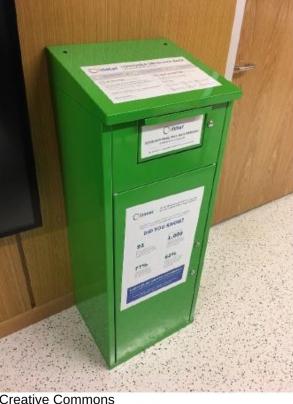 By David R. Shorey, East County Programs Manager, Institute for Public Strategies
By David R. Shorey, East County Programs Manager, Institute for Public Strategies
David R. Shorey
February 16, 2021 (San Diego) -- San Diego Sheriff’s stations and headquarters have been available for more than a decade for disposal of unused prescription medication. There are 26 such drop-off locations throughout San Diego County and the program has collected over 100,000 pounds of prescriptions so far. For some, going to a law enforcement location to dispose of prescription drugs can be an uncomfortable experience. So the potential of medication being flushed down the drain or falling into the hands of those other than prescribed is heightened. This poses an environmental threat and a deadly threat, especially to youth.
Thanks to a 2018 state law (SB212), the medication disposal options have expanded throughout California. The law allows for secure locations like pharmacies to collect unused medications. This has added 11 disposal locations in East County alone and a great deal more throughout San Diego County. While initially funded by the State of California, the law mandates that the prescription drop-off boxes, collection and destruction will be paid for by pharmaceutical companies by next year. More than 200 disposal locations have been added across California, with the potential to expand further in 2022.
 A recent survey by the San Diego County Prescription Drug Abuse Task Force shows 31% of respondents store their unused prescriptions at home. In addition to local efforts, the Drug Enforcement Administration’s Prescription Drug Take-Back Day is held nationally twice a year in April and October. The first one in 2021 was scheduled for April 24.
A recent survey by the San Diego County Prescription Drug Abuse Task Force shows 31% of respondents store their unused prescriptions at home. In addition to local efforts, the Drug Enforcement Administration’s Prescription Drug Take-Back Day is held nationally twice a year in April and October. The first one in 2021 was scheduled for April 24.
Limiting youth access to prescription medications is one of the benefits of this program. With many schools closed, kids who are stuck at home due to COVID-19 may be tempted to reach for the medicine cabinet. According to a recent study published in the Journal of Adolescent Health, “It is safe to assume that many young people are experiencing significant hardship during this time because of social isolation, overexposure to family members who may be unsupportive or even abusive, lack of athletics and other healthy outlets, broken ties to school and community supports, and severe restrictions on the much-needed freedom to express independence and take healthy risks.” All of these factors may have an impact on youth decision making regarding use of prescription medication which they were not prescribed.
 The total impact of stay-at-home orders on teen drug use may not be known for some time since drug use surveys are conducted in classrooms. We do know that COVID-19 has had a significant impact on adult substance misuse. It’s reasonable to assume that, once the teen surveys are conducted, youth substance use will be similarly affected. A study conducted outside the classroom over the last year shows some hopeful results, highlighting that youth access to drugs and alcohol outside the home has decreased significantly. However, according to the study, “It is important to acknowledge that, even as they have become less accessible outside of the home, increases in mental health and substance use problems among adults due to the pandemic might make addictive substances more accessible to youth in some homes, as might more relaxed parental rules around youth substance use within the home.”
The total impact of stay-at-home orders on teen drug use may not be known for some time since drug use surveys are conducted in classrooms. We do know that COVID-19 has had a significant impact on adult substance misuse. It’s reasonable to assume that, once the teen surveys are conducted, youth substance use will be similarly affected. A study conducted outside the classroom over the last year shows some hopeful results, highlighting that youth access to drugs and alcohol outside the home has decreased significantly. However, according to the study, “It is important to acknowledge that, even as they have become less accessible outside of the home, increases in mental health and substance use problems among adults due to the pandemic might make addictive substances more accessible to youth in some homes, as might more relaxed parental rules around youth substance use within the home.”
According to the San Diego Association of Government’s (SANDAG) 2019 report on drug use by juvenile arrestees in the San Diego region, 42% reported that they misused prescription drugs. It was most often opioids or benzophenones because 50% of them found them easy to get at home.
Unused prescriptions should be stored safely until they can be properly disposed. Keep medications in areas inaccessible to youth and out of sight. Don’t leave medications out. Use the safety lock on pill bottles. Locking medicine cabinets can also reduce access. Have a conversation with your children about the deadly consequences of taking someone else’s prescription medication. Don’t associate medication with candy to entice children to take their prescribed meds. Keep the Poison Control hotline handy. The phone number is (800) 222-1222.
The drug collection bins will accept most standard prescriptions. But certain medications like chemotherapy drugs cannot be accepted. Syringes, liquid medications over six ounces, vitamins and dietary supplements are not accepted. A full list of what can and cannot be disposed of and a map of the disposal locations can be found at takebackdrugs.org, the California Drug Take-Back Program website.













Recent comments